In order to be a successful deer hunter on some regular basis hunters have to minimize the bad things deer see, hear and smell. These three senses can make or break a hunt. It is up to the individual hunter to not let these three controllable things break their hunt.
SIGHT
Like most hunters, I have ruined a good shot opportunity because I moved when I should have been rock still. Deer have great peripheral vision, and often catch a hunter’s movement out of the corner of their eye. A good rule of thumb to go by, is if you can see any part of a deer’s eye, it can see you.
To put the odds in your favor, do not move when a deer is looking directly at you. Wait until the deer’s head is behind a tree, down feeding, or looking away before you make any movement. This includes raising your gun or drawing your bow.
Not only are too many hunters busted in their stands, but also because of their entry and exit strategies.
An entire article could be written on proper entry and exit strategies. For the sake of this article consider your movements carefully. For example, you do not want to walk through a harvested corn field that is full of deer after an evening hunt. Instead, plan an exit strategy that will take you wide around the field to prevent spooking the deer.
I have even waded creeks to avoid disturbing deer. Because I knew ahead of time my route would take me through water both entering and exiting, I was able to put on waders at the creek, make the walk and then take them off when I exited the water. A pair of waders will fit in a backpack, or you can just leave the waders near the creek. Now, this is not a normal situation, I just giving an example of what might have to be done to avoid spooking deer.
It is not hard to go undetected while in a deer stand. Do not move until you have to, and when you have to, do it very slow. To keep movement to a minimum, keep all your gear within easy reach. If possible, hang your stand in a cluster of trees rather than in a single, bare tree.
SOUND
There are two types of sounds in the deer woods: normal and strange. The normal sounds to a deer are squirrels jumping from branch to branch, a blackbird chirping, a doe bleat, the wind blowing through the trees, etc.… the strange include a human sneeze, metal striking against metal, unusual walking sound, a truck door slamming, and so on.
Take every precaution to not make unnecessary noise. Of course, you can’t prevent all of it.
If you planned your exit and entry strategies as I have already suggested, hopefully you took into consideration how loud you are on your approach and even your exit.
You cannot avoid all strange sounds, but do your best to lessen them. Step lightly, watch every foot fall, and avoid stepping on twigs and branches.
SMELL
Our ability to smell does not even come close to holding a candle to the abilities that a whitetail deer has. A deer can’t only smell you, but it can smell where you have been. It can even have a good idea how long ago you where there. Knowing this now, it is a wonder I ever killed a deer when I first began hunting, and it goes to show how important odor control is.
How many times have you heard a deer hunter say, “play the wind”? This means to be in a position that the wind blows your scent away from where you expect deer to be, or approach from.
Even though your odor is moving away from the deer, you should do what you can to lessen the odors that are in the air. Even though you can’t smell them, your body is constantly giving off odors. Precautions have to be taken to keep them minimal, and/or to cover them up.
Preventive measures include washing your clothes with scent-free laundry detergent, using scent free dryer sheets intended for hunters, odorless shampoo body wash and deodorant. All of these products are manufactured specifically with hunters in mind.
Do not wear colognes, and leave your cigarettes back in the truck. Before taking the walk to your stand, spray down with scent elimination spray. Spray again before climbing up, and so every hour or so while on stand.
Dress in layers when walking to your stand. Do not overdress which could cause perspiration. Instead, wear as little as you can to comfortably make the walk, and put the rest on at the stand. Spray down with scent elimination spray, and climb up.
Avoid having to fill up your vehicle with gasoline as you travel to hunt. Do not stop at a greasy diner, and do not wear your hunting boots until you get to your destination.
Lastly, if the wind changes and is no longer a “good wind”, or it begins to swirl, get down. Use an unscented powder that you can squeeze into the air to detect wind direction.
You will never be able to beat these three senses of a whitetail completely, but you can minimize the damage by taking some simple precautions.
Photo: Howard Communications

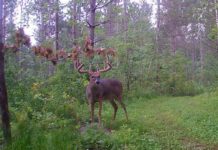
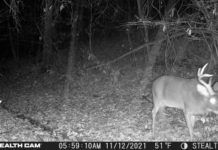

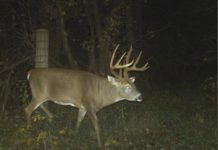


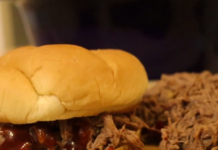

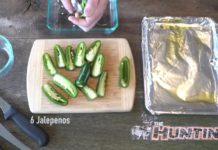
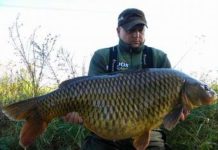
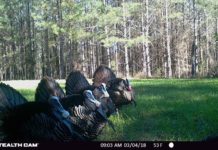
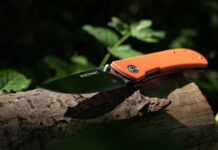
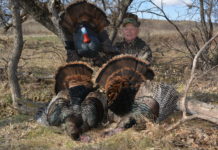

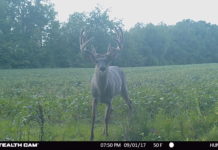
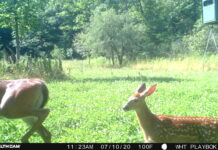
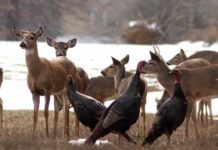

![The Best Deer Camp Chili [VIDEO] Deer Chili Ingredients, Tomatoes, Chili Spices](/wp-content/uploads/2015/10/Deer-Chili-Deer-Camp-Recipe-218x150.jpg)
![How to Call Elk Early in the Season [VIDEO]](/wp-content/uploads/2016/08/byers003-218x150.jpg)




![Idiots Disturb Hunter: How Would You Have Handled It? [VIDEO]](/wp-content/uploads/2015/10/DSC00110-e1474487693878-100x70.jpg)
![Albino Buck Shocked to Shed His Antlers [VIDEO]](/wp-content/uploads/2015/10/AlbinoDeer-100x70.jpg)